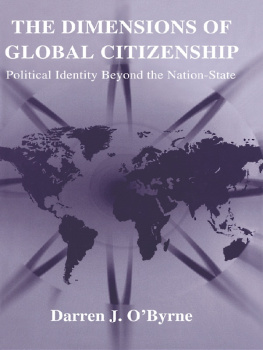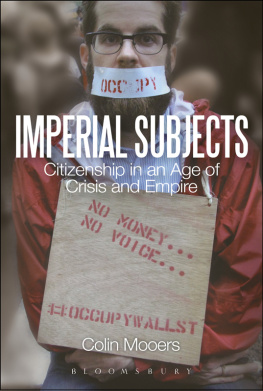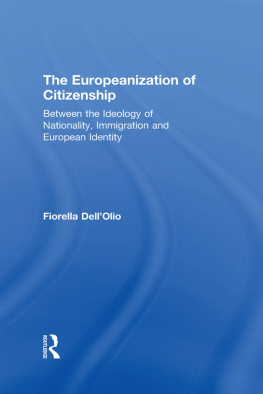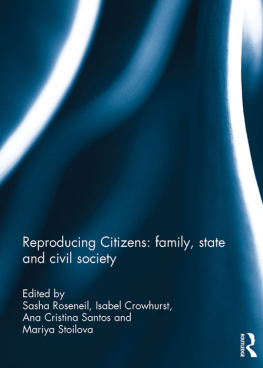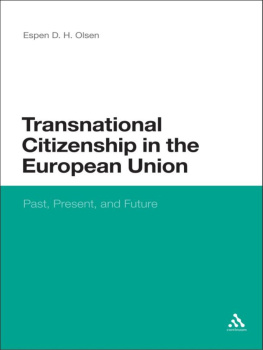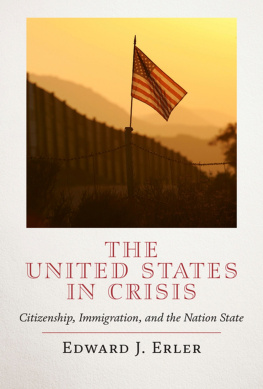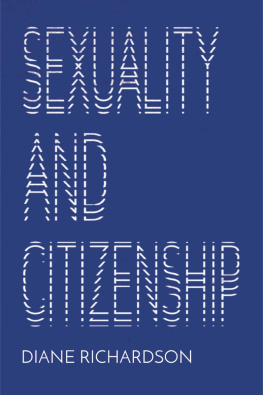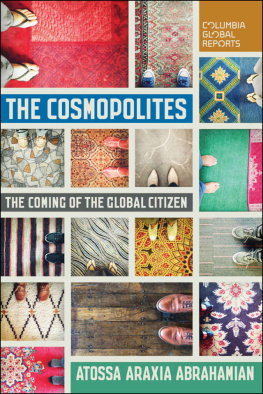First published in 2003 in Great Britain by
FRANK CASS & CO. LTD
Crown House, 47 Chase Side
Southgate, London N14 5BP
This edition published in the Taylor & Francis e-Library, 2005.
To purchase your own copy of this or any of Taylor & Francis or Routledges collection of thousands of eBooks please go to www.eBookstore.tandf.co.uk.
and in the United States of America by
FRANK CASS
c/o ISBS, 920 NE 58th Avenue, Suite 300
Portland, Oregon, 972133786
Copyright 2003 Darren J.OByrne
British Library Cataloguing in Publication Data
OByrne, Darren J.
The dimensions of global citizenship: political identity beyond the nation-state
1. World citizenship 2. GlobalizationPolitical aspects
I. Title
323.6
ISBN 0-203-00932-0 Master e-book ISBN
ISBN 0 7146 5444 2 (Print Edition)
Library of Congress Cataloging-in-Publication Data
OByrne, Darren J.
The dimensions of global citizenship: political identity beyond the nation-state / Darren J. OByrne.
p. cm.
Includes bibliographical references and index.
ISBN 0-7146-5444-2 (cloth)
1. World citizenship. 2. Globalization. I. Title.
JZ1320.4.O28 2003
323.6dc21
2003046155
All rights reserved. No part of this publication may be reproduced, stored in or introduced into a retrieval system, or transmitted, in any form or by any means, electronic, mechanical, photocopying, recording or otherwise, without the prior written permission of the publisher of this book.
Foreword
Citizenship has always been a contested concept, with views differing on whether it refers to a purely legal relation defined in terms of rights and duties between the individual and the political community or an active condition based on participation in civil society. Although these two conceptions of citizenshipwhich roughly correspond respectively to the liberal and communitarian traditionsdiffer, they share the assumption that citizenship entails membership of a political community and that this is a condition of equality. The primary goal of citizenship was equality between members of a tightly defined polity. The territorial limits of the polity, generally equated with the nation-state, were rarely questioned and neither was the cultural dimension of group membership. The traditional conceptions of citizenship on the whole did not consider the question of the problem of cultural diversity and competing conceptions of the common good.
It has increasingly been recognized that the question of diversity has entered the discourse of citizenship which now must reconcile the pursuit of equality with the recognition of diversity. Inevitably, this has led to debates on the politics of inclusion and exclusion. Ever since the late 1980s feminists and proponents of multicultural citizenship have been important in re-politicizing citizenship in this direction of radical pluralism. Only very recently, in the aftermath of the great global transformations since 1989, has an additional discourse of citizenship emerged, namely global citizenship.
The idea of global citizenship, the subject of this valuable book, has entered the contemporary political imagination for several reasons. The interest more generally in citizenship is undoubtedly due to the crisis in neoliberalism, the rise of new kinds of globally organized anti-systemic movements, the growing consciousness that globalization entails new kinds of questions for political membership, global responsibilities for the future and new conceptions of personhood. The territorial boundaries of political community have been rendered diffuse as a result of legal cosmopolitanism in areas of human rights, which have changed the nature of membership making it more difficult to differentiate insiders from outsiders, International Non-Governmental Actors and other kinds of advocacy governance. Citizenship is no longer a bundle of rights and duties but has a wider and more transformative dimension. The concept of citizenship has been disembedded from national societies; it is no longer equated with the condition of nationality, that is, membership of a particular national polity, and may even be in tension with it.
The reality of global citizenship cannot be denied. Darren OByrne argues persuasively for the contemporary relevance of citizenship having a global dimension. Global citizenship, he argues, is not reducible to particular institutional arrangements, such as a world government; it is rather a response to the growing consciousness of the interconnected nature of the world and the fact that the responsibilities of citizenship extend beyond particular polities to the wider world. Global citizenship is clearly related to globalization and the growing recognition that citizenship extends beyond the horizons of the nation-state to encompass global forms. One school of thought rejects the very notion of citizenship beyond the nation-state as neither possible nor desirable. Others see opportunities for citizenship in areas of governance and new transnational spaces beyond the level of the nation-state. It would be a mistake to see global citizenship as an alternative to other kinds of citizenship, such as a national and local citizenship; it should instead be conceived of as an additional dimension of citizenship that has come into existence today along with the extension of democratization. Combining perspectives in social and political theory, sociology and political science, this book offers a defence of global citizenship as a pragmatic response to real problems.
GERARD DELANTY
University of Liverpool
Acknowledgements
I am grateful for the support and advice offered by colleagues and friends during the time spent carrying out and writing up this project. The guidance of Martin Albrow and John Eade has been invaluable. Comments and suggestions made by Graham Fennell, William Outhwaite, Maurice Roche, Ian Lister, Neil Washbourne and Jrg Drrschmidt have also been extremely helpful, and I am most grateful for them. None of this would have been possible without the support of the Roehampton research office, or the priceless assistance of Linda Wilson. Support of a different kind was provided by Noel Sheridan., manager of the Southlands College bar, where I sought refuge during the long evenings spent writing this book. David Gallup and Garry Davis shared their thoughts and their precious time with me during my stay in Washington, for which I give thanks. Finally, and perhaps above all, I would like to express my very sincere thanks to my valued former colleague Sarah Cant, whose friendship, support and good nature have seen me through many a moment of frustration, academic and otherwise.
A version of Chapter 7 was published in P. Kennedy and C. Danks (eds), Globalization and National Identities: Crisis or Opportunity (Basingstoke: Palgrave, 2001), and thanks are given to the publishers and editors of that volume. The global field diagram is reprinted, by kind permission of Sage Publications Ltd, from R. Robertson, Globalization: Social Theory and Global Culture (London: Sage, 1992).
1
The Rediscovery of Citizenship
Citizenship is now a popular buzz word in sociological circles. New challenges, and new perspectives, have given a new lease of life to a hitherto stagnant concept. But we still do not have a shared, recognizable and satisfactory definition of citizenship.
INTRODUCTION
The interest among sociologists in the hitherto largely taken-for-granted concept of citizenship seemed to resurface during the 1980s and grew in significance throughout the 1990s. Up until that point, much of the debate over citizenship rights took the form of a static discussion between liberals, who were largely either defending or building upon Marshalls classic theory of citizenship, and Marxists, who were largely critical of the idea. As sociology sought to offer its variety of responses and explanations to the period of contemporary social change experienced on a global scale, so the assumptions which fuelled both ends of this debate became increasingly contested.

